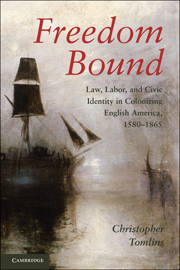Book contents
8 - Modernizing
Polity, Economy, Patriarchy
Published online by Cambridge University Press: 05 June 2012
Summary
Things are come to that pass now, that tho’ Masters have the Name of Government indeed, the Servants really govern throughout this Nation, and especially that Part of them who we hire for daily Labour, who if but one crooked Word be spoken to them, will turn their Backs upon you, and upon your Business, and be gone, in spight of Contracts and Bargains and in spight of any Damages you may suffer by it.
Daniel Defoe, The Great Law of Subordination Consider’d (1724)The original political right that God gives to Adam is the right, so to speak, to fill the empty vessel.
Carole Pateman, The Sexual Contract (1988)I doubt not but we shall soon have a very severe Law upon that Subject. But of this hereafter.
Daniel Defoe, The Great Law of Subordination Consider’d (1724)At a strategic moment early in his extended study of the culture of eighteenth-century working people, Customs in Common, the late E. P. Thompson invokes Daniel Defoe’s vexed anatomy of English social relations, The Great Law of Subordination Consider’d (1724), to oil the hinge of a fundamental transformation he contends was afoot in eighteenth-century English society. Pointedly, Thompson notes Defoe’s observation that an England was coming into being in which, unless decisive measures were taken, “the Poor will be Rulers over the Rich, and the Servants be Governours of their Masters, the Plebeij have almost mobb’d the Patricij … in a Word, Order is inverted, Subordination ceases, and the World seems to stand with the Bottom upward.” In the throes of his anxiety for orderliness, says Thompson, Defoe has correctly foreseen two essential characteristics of the coming century: First, growing social polarization between on the one hand the world of the “patrician” gentry (an “agrarian bourgeoisie,” crowned at its metropolitan apex by a parasitic “banditti,” the whole representing “predatory oligarchic power” in operation) and on the other the local, customary, and largely opaque world of “plebeian” culture; but also, second, a simultaneous erosion of the mechanisms upon which patricians had relied in earlier generations to maintain plebeians in place – the “old means of social discipline”; more precisely, the forms and institutions of legal subordination.
For Thompson, Defoe’s narrative offers concrete examples of the impact of waxing freedom in the petty interactions of daily life. He draws particular attention to Defoe’s indignant account of a poor cloth worker’s carefully calibrated defiance of a magistrate before whom he has been hauled to answer for neglecting his work.
- Type
- Chapter
- Information
- Freedom BoundLaw, Labor, and Civic Identity in Colonizing English America, 1580–1865, pp. 335 - 400Publisher: Cambridge University PressPrint publication year: 2010



